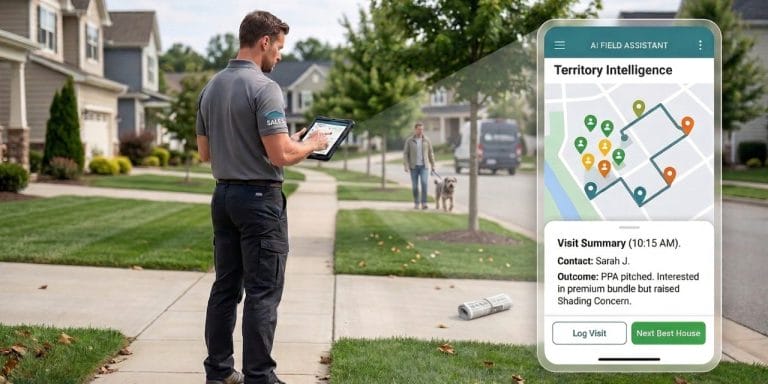Building a successful sales organization is like constructing a skyscraper: you need a rock-solid foundation and the right tools to reach new heights. A well-defined sales plan provides that foundation, but execution separates winners from wannabes.
Modern sales planning tools provide the structure, data, and automation that transform ambitious revenue targets into tangible results. These platforms go far beyond digital address books or basic calendars. They function as comprehensive command centers designed to streamline every aspect of your sales process, from territory mapping and lead management to performance analytics and forecasting.
The benefits hit immediately: boosted efficiency, pinpoint-accurate forecasting, and lightning-fast responses to market shifts. Sales leaders gain better-informed decision-making capabilities and more predictable revenue streams. Reps get clearer paths to quota and maximized earnings potential. Investing in the right sales planning software accelerates growth and builds a more effective sales force.
Sales Planning Tools Comparison Summary
Get a quick overview of our top picks below. Click on any tool name to jump directly to its detailed review.
| Tool | G2 Rating | Best For | Starting Price |
|---|---|---|---|
| SPOTIO | 4.5/5 | Field sales team engagement and optimization | Custom pricing |
| Pipedrive | 4.3/5 | Simplifying sales management | $14/user/month |
| Monday Sales CRM | 4.6/5 | Visual, intuitive planning for SMBs | $12/seat/month |
| HubSpot Sales Hub | 4.4/5 | Managing the entire sales funnel | $45/user/month |
| Gong | 4.8/5 | Analyzing customer conversations with AI | Custom pricing |
| Clari | 4.6/5 | Revenue analysis and forecasting | Custom pricing |
| Varicent | 4.5/5 | Building and deploying go-to-market strategies | Custom pricing |
| Anaplan | 4.6/5 | Complex sales scenario modeling | Custom pricing |
| Salesforce Sales Cloud | 4.4/5 | Enterprise-level sales planning and CRM | $25/user/month |
Now that you’ve seen the landscape of available options, let’s dive deeper into what makes these tools essential for modern sales success.
What Are Sales Planning Tools?
Sales planning tools are software applications designed to help businesses strategize, manage, and accelerate their sales processes. They assist sales leaders in setting goals, defining territories, allocating resources, and creating actionable plans to achieve revenue targets, while enabling sales reps to execute those plans efficiently.
For a deeper dive into creating a strategic framework, explore our guide to the 30-60-90-day sales plan.
Transform Your Sales Process: Key Benefits
Adopting dedicated sales planning tools moves your team from reactive firefighting to proactive revenue generation. Here’s how these platforms deliver measurable impact:
- Enhanced Strategic Alignment: Every sales activity connects directly to overarching business objectives. Clear visibility into goals and progress ensures individual efforts align with company targets—everyone pulls in the same direction.
- Improved Efficiency and Productivity: Automation handles administrative tasks like data entry, activity logging, and reporting, freeing reps to focus on what drives revenue: connecting with prospects and closing deals.
- Data-Driven Decision-Making: Centralized access to real-time data and analytics empowers sales leaders to make informed decisions quickly. These platforms provide insights into team performance, pipeline health, and forecast accuracy, enabling rapid strategy adjustments.
- Accurate Forecasting and Predictability: Historical data and sales activity tracking deliver more reliable sales forecasts. This predictability proves crucial for resource allocation, financial planning, and setting realistic team targets.
- Scalable Growth Infrastructure: As teams expand, managing territories, quotas, and compensation plans becomes increasingly complex. Sales planning software provides scalable infrastructure to manage this complexity without breaking existing processes.
Mastering sales operations planning unlocks these benefits. Similarly, a well-defined sales action plan brings strategy to life.
Essential Capabilities: What to Look For
When evaluating platforms, focus on these core capabilities that support modern sales teams:
- Territory Management: Design, manage, and balance sales territories effectively. Look for geographic mapping, account distribution, and territory performance analysis to ensure equitable workloads and maximum market coverage.
- Sales Forecasting: Robust forecasting modules predict revenue and manage performance accurately. The best tools provide customizable dashboards and analytics for tracking pipeline and predicting outcomes with higher precision.
- Quota and Goal Setting: Clear processes for setting and tracking individual and team quotas. This includes scenario modeling capabilities and target adjustments based on historical performance and market potential.
- CRM Integration: Seamless integration with existing CRMs (like Salesforce) ensures data flows freely between systems, providing a single source of truth and eliminating manual data entry.
- Reporting and Analytics: Powerful reporting features deliver actionable insights through customizable dashboards, performance leaderboards, and detailed activity reports for monitoring progress and identifying coaching opportunities.
An effective sales territory plan anchors this entire process.
How to Select the Right Sales Planning Tool
Choosing from a crowded market requires focus on your team’s specific needs and workflows.
Identify Primary Pain Points: Are you struggling with inefficient route planning for field sales? Is forecasting consistently inaccurate? Do you lack visibility into sales rep activity? Pinpointing biggest challenges helps prioritize features that offer immediate value.
Evaluate Tech Stack Integration: The ideal tool integrates seamlessly with your CRM and critical business systems, creating unified workflows. Consider implementation ease and vendor support levels.
Prioritize User Adoption: Powerful tools only work if teams actually use them. Look for intuitive interfaces and comprehensive training resources. Seek solutions that scale with business growth for long-term value.
For additional guidance, learn how to build a winning sales management process.
The 9 Best Sales Planning Tools for Growth in 2025
1. SPOTIO: Field Sales Team Optimization Leader
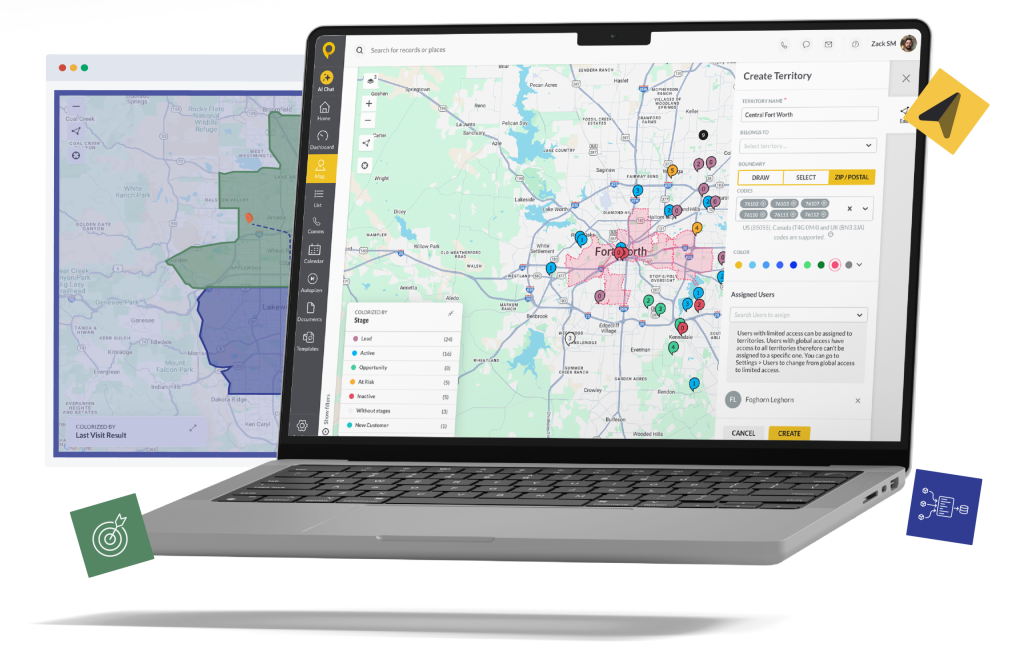
G2 Rating: 4.5/5
Best Use Case: Field sales team engagement and optimization
SPOTIO leads the field sales engagement platform category, designed specifically for outside sales teams’ unique challenges. The platform combines territory management, route planning, activity tracking, and sales analytics into a single, mobile-friendly solution that empowers field reps and provides managers with essential visibility.
Standout Features:
- Territory Management: Create, assign, and manage territories with balanced workloads and complete market coverage
- Route Planning: Automatically optimize daily sales routes to minimize driving time and maximize prospect face-time
- Activity Tracking: Capture every sales activity in real-time with GPS verification for clear field visibility
- Lead Generation and Management: Identify and capture new leads on the go, managing pipeline from first contact to close
Pricing: Custom pricing based on team size and specific needs. Request a personalized demo through their website.
2. Pipedrive: Sales Management Simplified
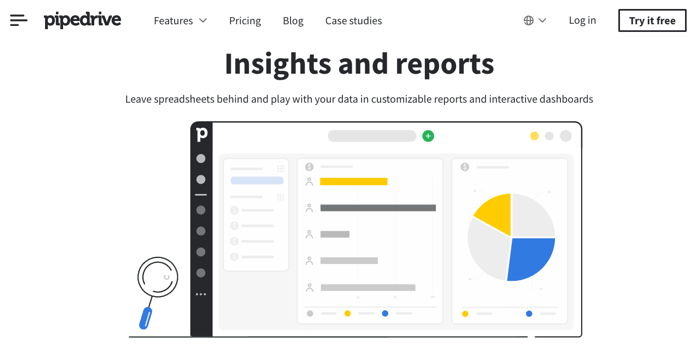
G2 Rating: 4.3/5
Best Use Case: Simplifying sales management
Pipedrive delivers sales-focused CRM known for visual pipeline management, helping salespeople track deals and activities with exceptional clarity. Built by salespeople for salespeople, it emphasizes simplicity and action-oriented features that drive the sales process forward.
Standout Features:
- Visual Sales Pipeline: Clear, drag-and-drop interface for managing deals through stages
- Activity-Based Selling: Prompts users to schedule next actions for every deal, preventing lost opportunities
- Customizable Reporting: Build reports to track key metrics and sales goals
- Workflow Automation: Automate repetitive administrative tasks
Pricing: The “Lite” plan starts at $14 per user/month when billed annually. Also available are Growth, Premium, and Ultimate Plans.
3. Monday Sales CRM: Visual Planning for SMBs
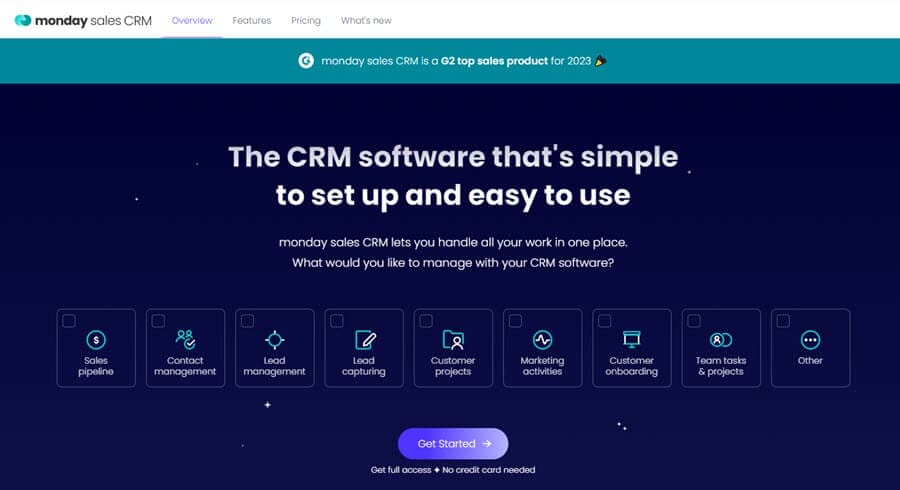
G2 Rating: 4.6/5
Best Use Case: Visual, intuitive planning for SMBs
Monday Sales CRM builds on the flexible Monday.com Work OS platform, offering highly visual and customizable solutions. It’s particularly well-suited for small to medium-sized businesses needing tools that adapt to unique sales processes.
Standout Features:
- Customizable Dashboards: Create visual dashboards tracking every sales cycle aspect
- Centralized Communication: Keep all deal-related emails, notes, and documents in one place
- No-Code Automations: Easily automate tasks like follow-up reminders without coding knowledge
- Template Library: Quick-start with pre-built templates for various sales processes
Pricing: Free individual plan available, paid plans start at $12 per seat/month when billed annually.
4. HubSpot Sales Hub: Complete Funnel Management
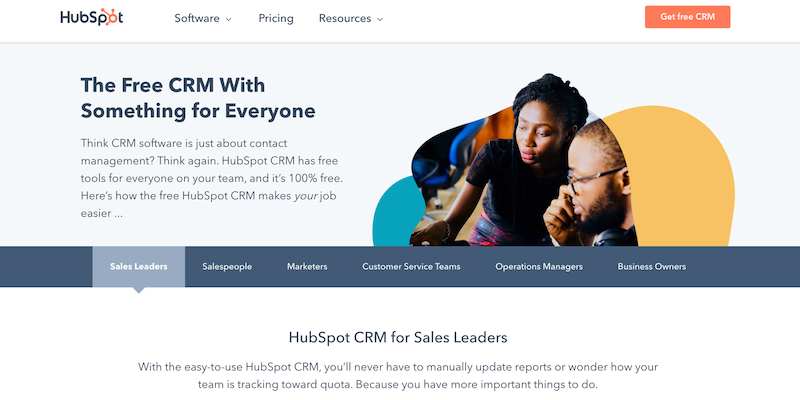
G2 Rating: 4.4/5
Best Use Case: Managing the entire sales funnel
HubSpot Sales Hub provides comprehensive sales software within the broader HubSpot ecosystem. It offers extensive tools for every sales process stage, from lead generation to closing deals and managing customer relationships, built on a free CRM foundation.
Standout Features:
- Sales Automation: Automate email sequences and follow-ups for effective lead nurturing
- Meeting Scheduler: Eliminate back-and-forth emails with calendar-synced scheduling
- Reporting and Analytics: Access detailed reports on sales performance, productivity, and pipeline health
- Free CRM Foundation: Robust, free CRM for managing contacts and deals
Pricing: Free tools available, paid Sales Hub plans start at $45 per user/month when billed annually.
5. Gong: AI-Powered Conversation Intelligence
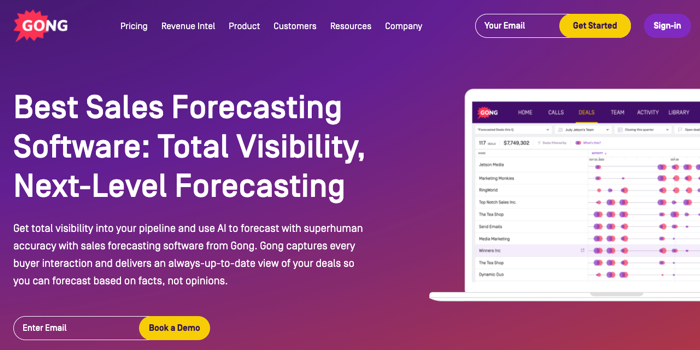
G2 Rating: 4.8/5
Best Use Case: Analyzing customer conversations with AI
Gong operates as a revenue intelligence platform using AI to analyze customer-facing conversations, including calls, emails, and web conferences. It provides sales teams with deep insights into what works in their sales process, enabling data-backed coaching and strategy refinement.
Standout Features:
- Conversation Intelligence: Automatically records and transcribes sales calls, identifying key topics and action items
- Deal Intelligence: Provides deal health visibility by analyzing related conversations
- Market Intelligence: Uncovers customer conversation insights about competitors, trends, and product feedback
- AI-Powered Coaching: Pinpoints coachable moments in rep conversations to improve performance
Pricing: Custom pricing available upon request based on user count.
For more performance-understanding tools, check out these sales analytics tools.
6. Clari: Revenue Analysis Platform

G2 Rating: 4.6/5
Best For: Revenue analysis and forecasting
Clari functions as a revenue platform using AI to provide end-to-end sales process visibility, from pipeline to forecast. It helps sales organizations run revenue processes with more rigor and predictability by automatically gathering data from various systems to present clear pictures of deal progress and risk.
Standout Features:
- Revenue Forecasting: AI-driven highly accurate revenue forecasts with at-risk deal identification
- Pipeline Management: Real-time, comprehensive pipeline views with conversion rate insights
- Activity Intelligence: Automatically captures sales activity data from emails, calendars, and CRMs
- Deal Inspection: Deep visibility into every deal’s status and history
Pricing: Custom pricing available by requesting quotes from their sales team.
7. Varicent: Complete GTM Strategy Platform
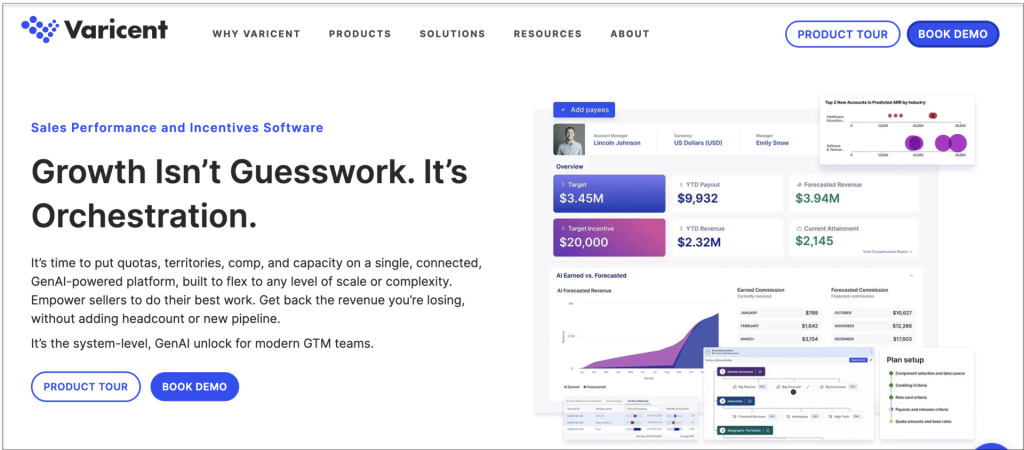
G2 Rating: 4.5/5
Best For: Building and deploying go-to-market strategies
Varicent delivers comprehensive sales performance management (SPM) beyond basic planning to cover territory management, quota setting, and incentive compensation. It’s designed to help businesses plan and execute go-to-market strategies more effectively while motivating sales teams through optimized compensation plans.
Standout Features:
- Incentive Compensation Management (ICM): Automates complex sales commission calculations and management
- Territory and Quota Planning: Tools for designing effective territories and setting achievable quotas
- Go-to-Market Planning: Aligns sales strategies with corporate objectives for cohesive approaches
- Advanced Analytics: Deep analytics to measure and improve sales performance
Pricing: Customized pricing available upon request.
8. Anaplan: Sales Scenario Modeling
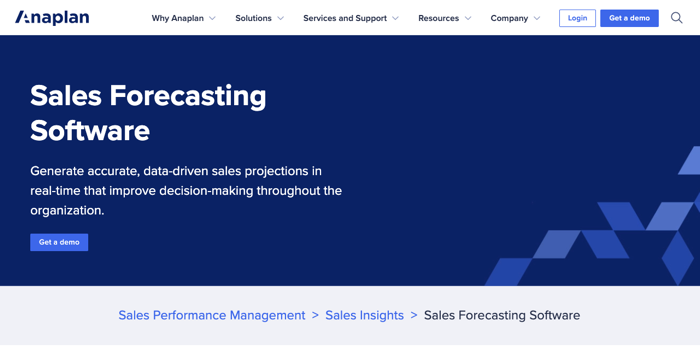
G2 Rating: 4.6/5
Best For: Complex sales scenario modeling
Anaplan operates as a connected planning platform enabling businesses to model different scenarios and make more agile decisions. For sales teams, it provides powerful capabilities for territory and quota planning, sales forecasting, and compensation management, allowing leaders to see downstream impacts of their decisions.
Standout Features:
- Connected Planning: Links sales plans with finance and operations for holistic business views
- Scenario Modeling: Model various outcomes for territory assignments, quota distribution, and compensation plans
- Real-Time Calculations: Instantly updates plans and forecasts as new data becomes available
- Collaborative Platform: Enables cross-functional collaboration on sales plans
Pricing: Subscription-based pricing tailored to organizational needs. Request quotes through their website.
9. Salesforce Sales Cloud: Enterprise CRM Leader
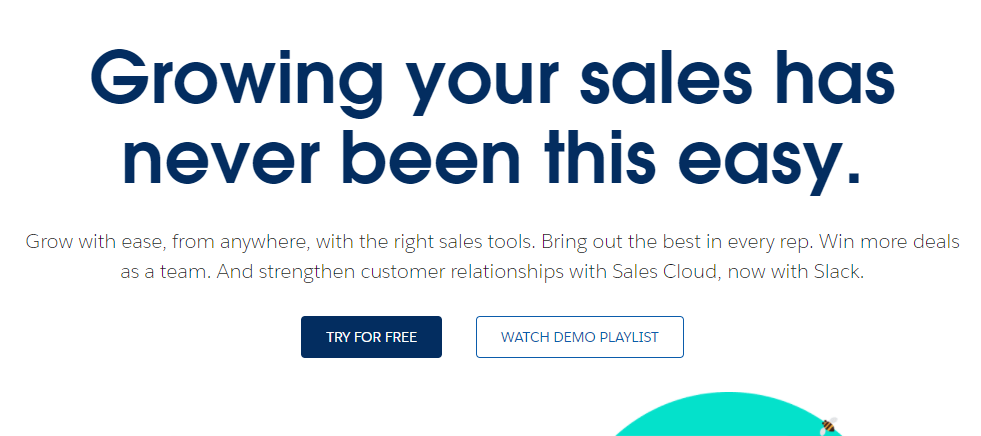
G2 Rating: 4.4/5
Best For: Enterprise-level sales planning and CRM
Salesforce Sales Cloud ranks among the world’s most widely used CRMs, offering vast suites of sales, marketing, and customer service tools. As a sales planning tool, it provides comprehensive platforms for managing every sales cycle aspect, making it powerful for enterprise-level organizations.
Standout Features:
- Lead and Opportunity Management: Track all lead and deal information and activity in central locations
- Process Automation: Use Process Builder and Flow tools to automate complex business processes
- Customizable Reporting and Dashboards: Real-time business views with detailed reports and dashboards
- Extensive AppExchange: Access thousands of third-party apps extending platform functionality
Pricing: Sales Cloud pricing starts at $25 per user/month (billed annually) for Starter edition.
Learn more about how Salesforce is used by sales reps to maximize effectiveness. Better yet, discover how SPOTIO’s integration with Salesforce supercharges your sales planning.
Discover How SPOTIO Elevates Field Sales Planning
Choosing the right sales planning tool significantly impacts team performance and company bottom lines. As you assess needs, consider unique team challenges and look for solutions providing targeted support. Testing top contenders through demos or trials determines which platform fits your workflow best.
For field sales teams, SPOTIO offers specialized solutions designed to address specific complexities of managing ground-based reps. By combining powerful territory management, automated route planning, and real-time activity tracking, SPOTIO gives teams clear plans for daily success. It empowers reps to work more efficiently while providing managers with visibility needed for strategic decisions.
Ready to see how SPOTIO transforms your field sales planning? Request a personalized demo today and discover smarter ways to manage your outside sales team.

